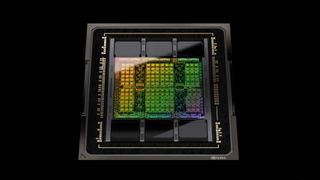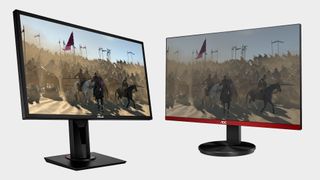Nvidia's next-gen GPU 'Ada Lovelace is no longer a simple Ampere refresh' rumours suggest
More fuel to the rumour fire that Nvidia's concerned about what AMD is doing with RDNA 3?

The latest noises about Nvidia's upcoming GPU architecture—codenamed either Ada, Lovelace, or Ada Lovelace, depending on who you talk to—is a lot more positive than those ugly 900W card rumours. Where once Lovelace was pegged as little more than a mild Ampere refresh, it is now being suggested that it's far more than that, and closer to a whole new GPU architecture.
Is this more evidence that AMD's upcoming RDNA 3 GPUs are worrying Jen-Hsun and co? That's certainly the intimation from tweaker @kopite7kimi, which seems to be suggesting that while it was once a refresh, it is not anymore. If the "the current AD102 is NOT the original AD102" then something has made Nvidia change tack.
I must clarify that the current AD102 is NOT the original AD102. Ada Lovelace is no longer a simple Ampere refresh, although it was like this in the beginning.April 29, 2022
Yeah, you can tell that we're getting ever-closer to a GPU battle royale as the rumour mill is aggressively grinding away at leak after leak from a few key Twitter accounts. We're betting on new high-end graphics cards, from both AMD and Nvidia, to land in our rigs towards the end of the year, and the closer we get to launch this is only going to ramp up.
But it's providing us with some interesting potential insights insights, and if nothing else some interesting things to consider as we head into what could be one of the closest battles for GPU dominance we've ever seen. And maybe even one where AMD could conceivably pull a Ryzen and come out on top.
And the potential for the rumours about RDNA 3 to actually translate into a dominant GPU architecture for once could be the reason that we're hearing about Nvidia testing an AD102-based graphics card that chugs down some 900W of juice. Similarly, why it might have chosen to pull a little more in from Hopper than maybe it was planning to for Lovelace.

Best gaming monitor: Pixel-perfect panels for your PC
Best high refresh rate monitor: Screaming quick screens
Best 4K monitor for gaming: When only high-res will do
Best 4K TV for gaming: Big-screen 4K PC gaming
However it shakes out, we're looking at a rubber meets the road moment when RDNA 3 and Lovelace come face-to-face, or chip-to-chip, where two very different architectural design choices will come into close contact.
Nvidia is piling along with a monolithic chip approach, packing as much N4 silicon as it can possibly manage into a GPU you could conceivably call a consumer chip. While AMD is going rogue, aiming to make the leap to GPU chiplets pay off for its graphics card division in the same way that it did when Ryzen adopted the chiplet approach.
The biggest gaming news, reviews and hardware deals
Keep up to date with the most important stories and the best deals, as picked by the PC Gamer team.
One is brute force, the other advanced, lean, and efficient. But the other way to look at it is one is tried and tested and the other an almost total unknown. How games respond to GPU chiplets is going to be fascinating, and potentially one of the pain points when it comes to testing them later this year.
Nvidia, however, will be hoping AMD pulls a Bulldozer rather than a Ryzen.

Dave has been gaming since the days of Zaxxon and Lady Bug on the Colecovision, and code books for the Commodore Vic 20 (Death Race 2000!). He built his first gaming PC at the tender age of 16, and finally finished bug-fixing the Cyrix-based system around a year later. When he dropped it out of the window. He first started writing for Official PlayStation Magazine and Xbox World many decades ago, then moved onto PC Format full-time, then PC Gamer, TechRadar, and T3 among others. Now he's back, writing about the nightmarish graphics card market, CPUs with more cores than sense, gaming laptops hotter than the sun, and SSDs more capacious than a Cybertruck.
Most Popular






